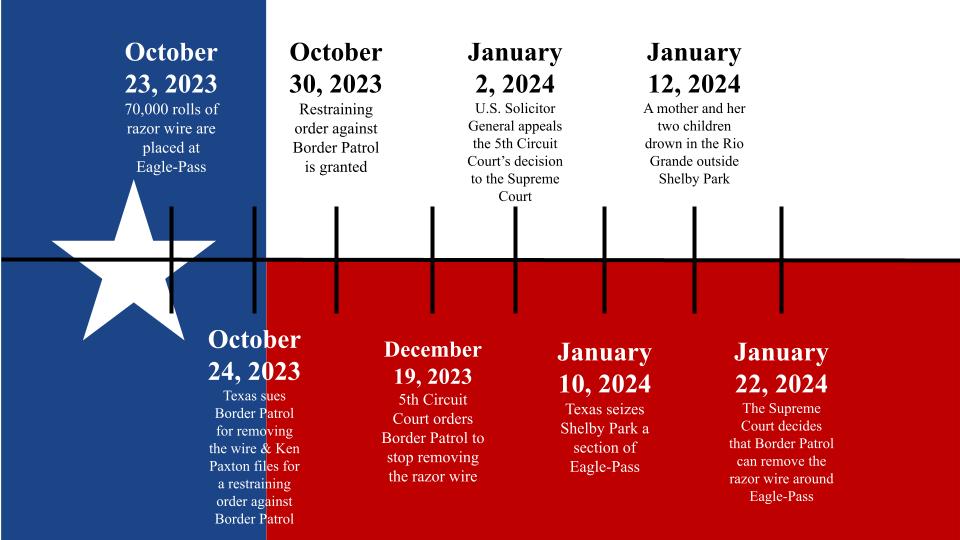Living in San Diego, California, which is just 17 miles from the United States-Mexico border, we often hear about border relations. This is not the same for other states that border Mexico, which has been made clear by the current Texas border disputes.
Currently, there is an alarming conflict in Texas between the Texas government and federal government centered around a 2.5 mile area in Eagle-Pass, Texas. This area has seen a surge in border-crossings, which prompted Texas authorities to take the situation into their own hands, according to CNN.
It is important to note that states cannot have their own immigration laws. The Constitution outlines federal powers and the rest is left to state governments in order to ensure a balance of powers. However, Ms. Katy Rees, U.S. History and Honors U.S. Government and Politics teacher, noted that, “as clear as that sounds on paper, when it comes into practice there are a lot of areas of conflict.” But, Ms. Rees added, “for most of history there has been a general understanding that border security is a federal matter.”
In December of 2023, Texas Governor Greg Abbott signed Senate Bill No. 4 into law “which also gives judges the ability to issue orders to remove people from the United States,” reported CNN. This law is unconstitutional, and on January 3, 2024 the Department of Justice sued Texas because this law is undermining the executive branch’s “‘exclusive authority’” to enforce immigration laws, according to CNN.
The U.S. Border Patrol has had over 6.3 million encounters with illegal crossings, from Mexico to the U.S., by immigrants since the Biden Administration was established in January 2021, 4 million (58%) of which were in Texas, according to the CATO Institute.
The increased numbers of border crossings caused Texas Governor Greg Abbott to launch Operation Lone Star in March 2021. This operation deployed the Texas National Guard, Texas Department of Public Safety (DPS), and other law enforcement to support border security, according to the CATO Institute. Conflict and tension arose between Texas authorities and Border Patrol almost immediately.
In October of 2023 the Texas National Guard placed 70,000 rolls of razor wire on the Eagle-Pass section of the border. This prevented people from entering the U.S., through this section, and hindered Border Patrol’s operations along one part of the Rio Grande River.
The Texas National Guard and DPS would occasionally cut through the wire to assist crossers, but Border Patrol often cut it without permission. In retaliation, on October 24, 2023 the state of Texas sued Border Patrol for cutting the wire and Texas Attorney General Ken Paxton filed a restraining order against Border Patrol to make them stop removing the wire, which was granted on October 30, 2023.
The court which heard the suit ruled against Texas so the state appealed to the United States Court of Appeals for the Fifth Circuit, which sided with Texas and ordered Border Patrol to stop removing wire on December 19, 2023. This prompted the U.S. Solicitor General, Elizabeth Prelogar, to file a request to the Supreme Court to overturn this decision on January 2, 2024.
Eight days later on January 10, 2024, the conflict came to a climax. Texas seized Shelby Park, which is a part of Eagle-Pass that borders the Rio Grande. According to CNN, on January 10 the Texas National Guard also blocked Border Patrol from placing surveillance devices in Shelby Park. The National Guard also began to place razor wire, fences, and gates along the park and neighboring golf course, preventing Border Patrol from accessing several areas in Eagle-Pass, including an important boat ramp.
On January 12, a mother and her two children drowned in the Rio Grande near Shelby Park as they attempted to cross, reported CNN. Both Border Patrol and Texas authorities claim the other is at fault for the tragedy. CNN noted that the Border Patrol reported to the area and spoke to a Texas National Guardsman through a gate, alerting them of the situation. They refused to open the gate even in an “emergency situation.”
U.S. Solicitor General Prelogar had filed a supplemental memorandum to the Court on the same day, noting that the “fencing further restricts Border Patrol’s ability to reach the river in particular areas.” Prelogar filed a second memorandum, after the drownings. She wrote that with access to the areas of Eagle-Pass Texas seized it was likely Border Patrol could have prevented the drownings, but “Texas made that impossible.”
The Department of Homeland Security set January 17 as the final date Texas could block Border Patrol from accessing the border. If they did not end the blockade, they would be referred to the Department of Justice. In response to this, Attorney General Paxton released a statement saying that, “Texas will not surrender.”
Despite Paxton’s claim on January 22, the Supreme Court decided against Texas in a 5-4 ruling, effectively allowing Border Patrol to remove the razor wire and to access the seized area, reported the CATO Institute.
The narrow vote is slightly distressing because immigration law is simply not in a state’s power. Governor Abbott’s response to the ruling is equally as distressing. Abbott released a statement on January 24 that read: “The failure of the Biden Administration to fulfill the duties imposed by Article IV, § 4 has triggered Article I, § 10, Clause 3, which reserves to this State the right of self-defense. For these reasons, I have already declared an invasion under Article I, § 10, Clause 3 to invoke Texas’s constitutional authority to defend and protect itself. That authority is the supreme law of the land and supersedes any federal statutes to the contrary.” Abbott is citing the invasion clause of the Constitution, and claiming that immigrants from Mexico are invading.
This is wrong.
The CATO Institute clarifies that according to precedent set by the Supreme Court with Padavan v. New York, where states had a similar claim based on the Invasion Clause considering immigrants, that “In order for a state to be afforded the protections of the Invasion Clause, it must be exposed to armed hostility from another political entity, such as another state or foreign country that is intending to overthrow the State’s government.” This is simply not the case in Texas.
Overall, Ms. Rees said that with the current divisive political climate and “Congress’ failure to pass meaningful immigration reform, states feel they have had to bear the burden of immigration costs and enforcement.” She noted that it helps that the Texas governor does not necessarily agree with the current administration’s political views, “so it sets off a political contest.”
Currently, 25 republican governors are backing Abbott according to CBS. This issue has become a political stand-off.









